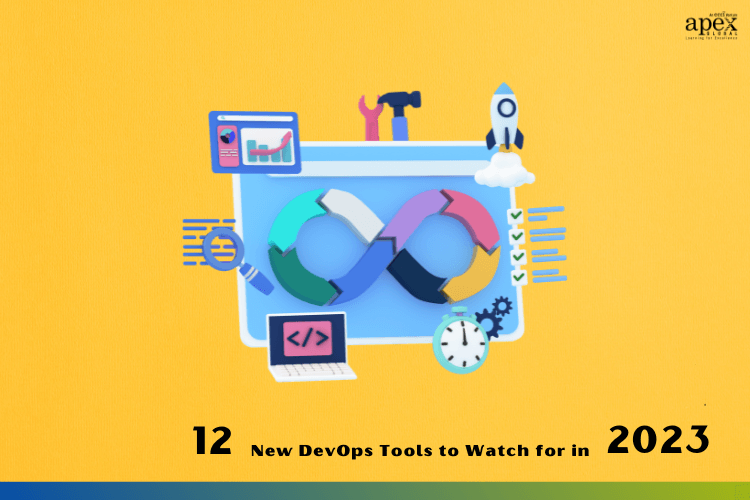DevOps is more than just a buzzword—it’s a culture shift that requires organizations to adopt new practices and equip their teams with the right tools. The journey to DevOps adoption can be challenging, but with the help of automation tools infused with AI and ML, the transition becomes smoother. In this blog post, we’ll explore the top 12 DevOps tools to keep an eye on in 2023. These tools will revolutionize the way organizations manage their software development lifecycle, automate infrastructure, and monitor applications. Let’s dive in and discover the future of DevOps!
What you'll find in this article [hide]
- 1 Challenges faced by DevOps teams
- 2 Strategies for fostering a culture of collaboration in DevOps teams
- 3 12 DevOps tools
- 3.1 Jenkins x: powering continuous integration
- 3.2 GitLab: empowering software development automation
- 3.3 Kubernetes: revolutionizing container management
- 3.4 Prometheus: empowering DIY application performance monitoring
- 3.5 Grafana: unleashing powerful graph building and monitoring
- 3.6 Ansible: streamlining application deployment and configuration management
- 3.7 Docker: empowering container management and integrations
- 3.8 Terraform: simplifying infrastructure management with code
- 3.9 Spinnaker: empowering multi-cloud continuous delivery
- 3.10 AWS CodePipeline: streamlining software development
- 3.11 Puppet: unleashing conflict detaching and situational awareness
- 3.12 Chef: empowering devops platforms with seamless configuration management
- 3.13 Honorary mentions:
- 4 Final thoughts
Challenges faced by DevOps teams
DevOps implementation comes with its own set of challenges, and teams in developing countries may encounter some specific hurdles. One challenge is the lack of awareness and understanding of DevOps practices among team members and organizational leaders. It may require extensive education and advocacy to drive adoption and change.
Another challenge is the shortage of skilled DevOps professionals in the region. Finding and hiring qualified talent with expertise in DevOps tools and practices can be a daunting task. Organizations may need to invest in training programs and professional development initiatives to bridge this skill gap.
Infrastructure limitations and connectivity issues can also pose challenges. Reliable and high-speed internet access is crucial for efficient collaboration and seamless integration of DevOps tools. Addressing these infrastructure challenges becomes essential for successful DevOps implementation.
Strategies for fostering a culture of collaboration in DevOps teams
Building a culture of collaboration is essential for successful DevOps implementation. Here’s a mock strategy that incorporates some of the tools from the list to foster collaboration within DevOps teams:
- Establish shared goals: Define common objectives that align with business outcomes and communicate them clearly to the entire team. Use tools like GitLab to manage project boards and issues, enabling visibility and collaboration on tasks.
- Cross-functional teams: Form cross-functional teams comprising individuals with diverse skill sets. Use Kubernetes to create development clusters that can be accessed by the entire team, promoting collaboration and shared ownership.
- Agile methodologies: Implement agile methodologies like Scrum or Kanban to encourage iterative development and continuous feedback loops. Use Jenkins X to automate the CI/CD process, enabling frequent releases and collaboration across development, testing, and deployment.
- Communication channels: Set up communication channels using tools like Slack or Microsoft Teams, allowing team members to collaborate in real-time and share updates, questions, and ideas.
- Knowledge sharing: Encourage knowledge sharing through lunch-and-learn sessions, internal wikis, or documentation. Use Grafana dashboards to visualize metrics and share insights, facilitating data-driven discussions and collaboration.
- Collaborative problem-solving: Foster an environment where team members can openly discuss challenges and brainstorm solutions. Utilize Ansible for infrastructure automation, enabling seamless collaboration on configuration management.
By implementing these strategies and leveraging tools organizations can foster a culture of collaboration within their DevOps teams. Collaboration becomes the foundation for shared responsibility, continuous improvement, and successful DevOps practices.
12 DevOps tools
Jenkins x: powering continuous integration
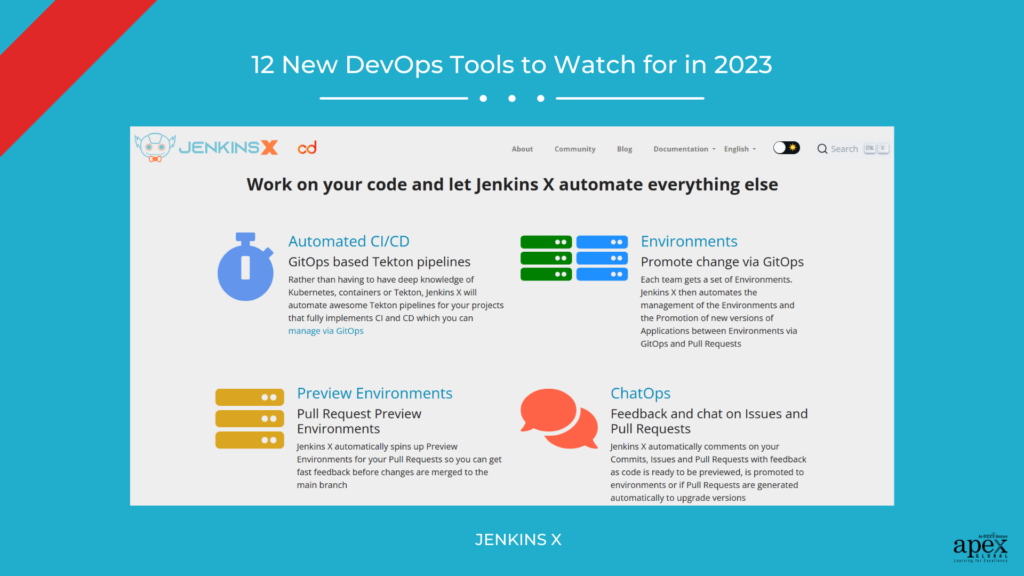
Jenkins X is a powerful DevOps tool specifically designed for continuous integration (CI). It excels in supporting internal and plugin extensions, making it a go-to choice for CI workflows. This open-source Java-based automation CI server is compatible with various operating systems, including Windows, macOS, and Unix OSs, and can be easily deployed on cloud-based platforms.
Features:
- Seamless integration with a wide range of CI/CD tools
- Extensive plugin ecosystem with over 1,500 options
- Simple installation and configuration process
- Distributed workflows for efficient and transparent builds, tests, and deployments
- Flexibility to scale and adapt to different platforms
Key Tip: Simplify your Kubernetes management by leveraging Jenkins X to automate cluster creation and application deployment. Streamline your development workflow and embrace the power of continuous integration and continuous deployment.
GitLab: empowering software development automation
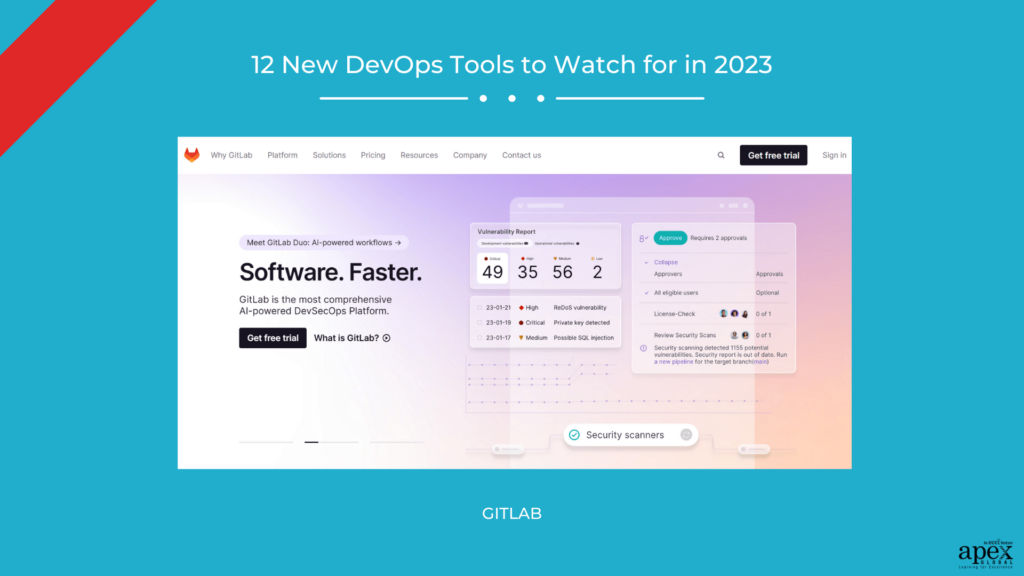
GitLab CI/CD is a robust tool that revolutionizes the software development process. With seamless integration of code repositories, streamlined code building, testing, and effortless application deployment, GitLab CI/CD takes your productivity to new heights.
- Automated software development process from start to finish
- Streamlined code repository management for enhanced collaboration
- Effortless code building and testing for reliable results
- Smooth application deployment for seamless delivery
- Highly scalable, supporting increased productivity and user growth
Key Tip: Optimize your software development lifecycle by utilizing GitLab’s all-in-one platform. From version control to continuous integration and deployment, GitLab has got you covered. Experience seamless collaboration and enhanced productivity.
Kubernetes: revolutionizing container management
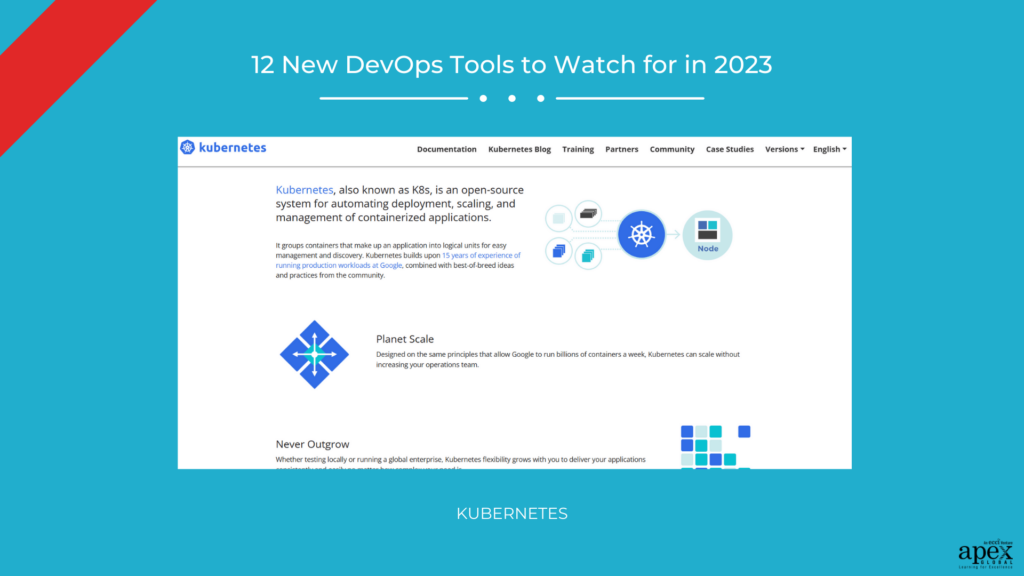
Kubernetes, the leading container management tool, empowers enterprises with seamless configuration management. It simplifies application deployment, updates configurations without rebuilding images, and ensures secure stack configurations.
- Effortless deployment and management of enterprise applications
- Update configurations without rebuilding container images
- Secure handling of secrets in stack configurations
- Centralized management of VMs and containerized workloads
- Intuitive self-service portals for developers and operations
Key Tip: Embrace the power of Kubernetes to simplify your containerized application management. With Kubernetes, effortlessly update application configurations without the need to rebuild container images.
Prometheus: empowering DIY application performance monitoring
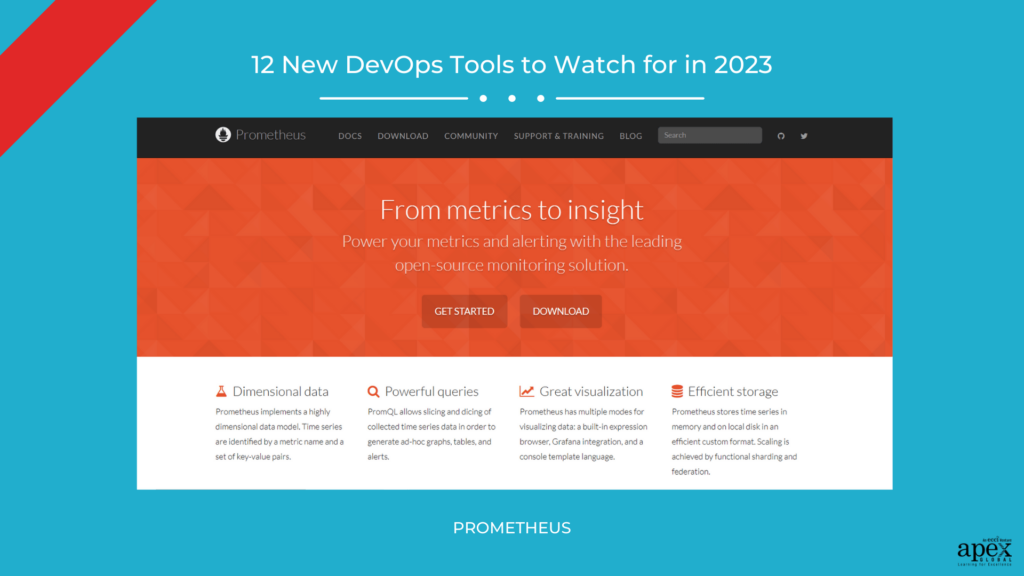
Prometheus stands out as the top choice for DIY application performance monitoring. This popular open-source tool resolves server monitoring needs and offers flexibility for customized setups.
- DIY solution for comprehensive monitoring setups
- Integrates with various channels for alerts
- No need to send metrics to third-party vendors
- Excellent server performance monitoring with Grafana integration
- Connect to remote storage options for durability and scalability
Key Tip: Flexible DIY Monitoring with Grafana Integration- With Prometheus, set up a customized monitoring server and seamlessly integrate with Grafana for powerful visualization and analytics. Monitor your server performance, receive alerts, and gain valuable insights into your application’s health and performance.
Grafana: unleashing powerful graph building and monitoring
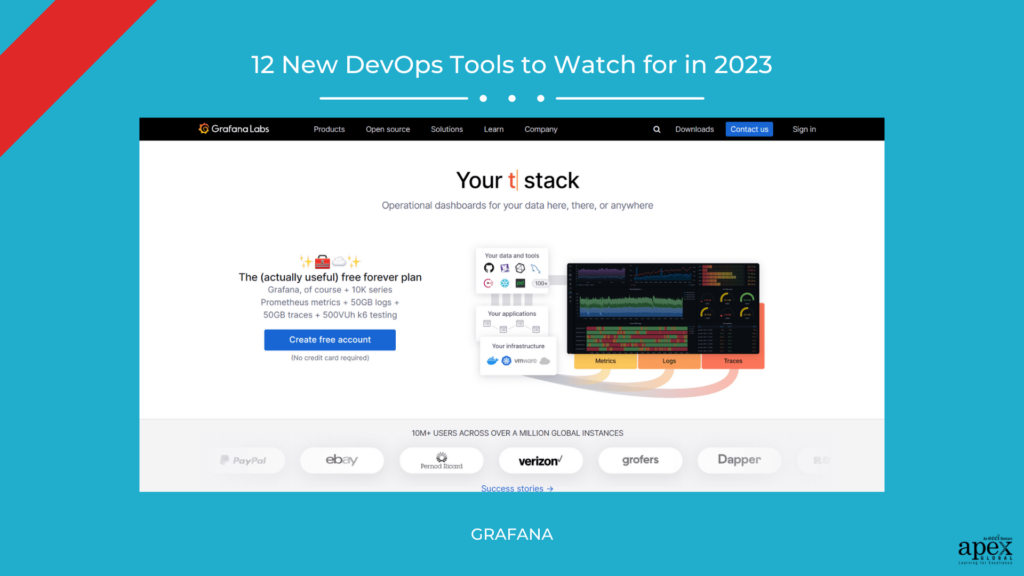
Grafana takes the crown as the best tool for deployment and server monitoring, with its flexibility and advanced graph-building capabilities. This open-source solution connects to various data sources and offers extensive customization options.
- Connects to multiple data sources for monitoring
- Flexible and sophisticated graph-building capabilities
- Various graph types for data transformation and visualization
- Build dashboards with multiple panels and data sources
- Set custom alert conditions across different series and time ranges
Key Tip: With Grafana, unleash your creativity by building powerful graphs and visualizing metrics from different sources on a single dashboard. Transform and display data with various graph types, and set customized alerts to stay on top of your server’s performance.
Ansible: streamlining application deployment and configuration management
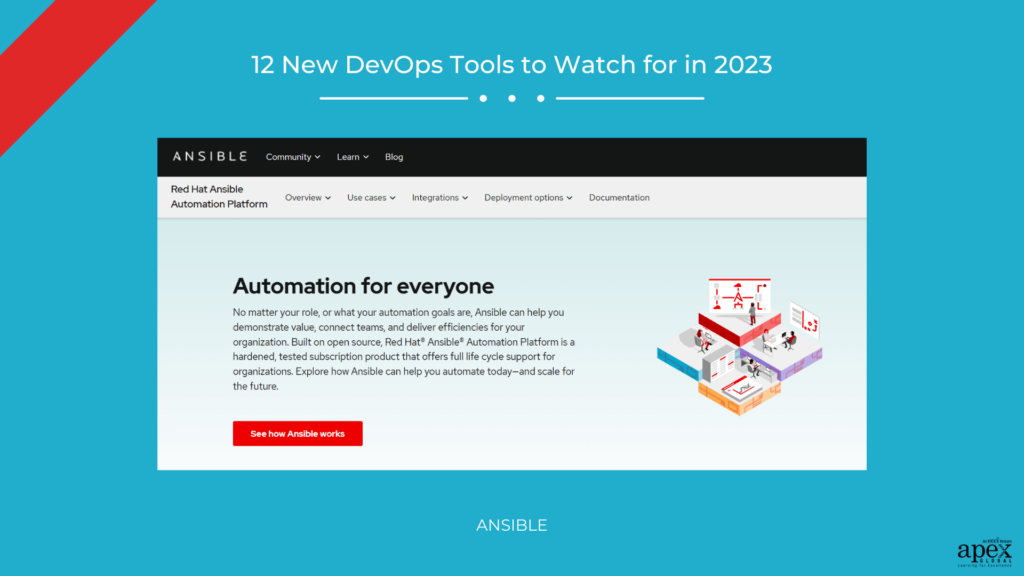
Ansible takes the lead as the best tool for configuration management and application deployment. This automation platform enables efficient system management, seamless deployment, and continuous delivery for businesses of all sizes.
- Simplifies configuration management and application deployment
- Supports continuous delivery and efficient system management
- Provides role-based access control and centralized IT infrastructure
- Enables the execution of security policies and service deployment
- Streamlines network administration and offers convenient dashboards
Key Tip: Streamline your infrastructure management with Ansible’s automation capabilities. Use its declarative syntax to define and enforce the desired state of your infrastructure, reducing manual effort and ensuring consistency.
Docker: empowering container management and integrations
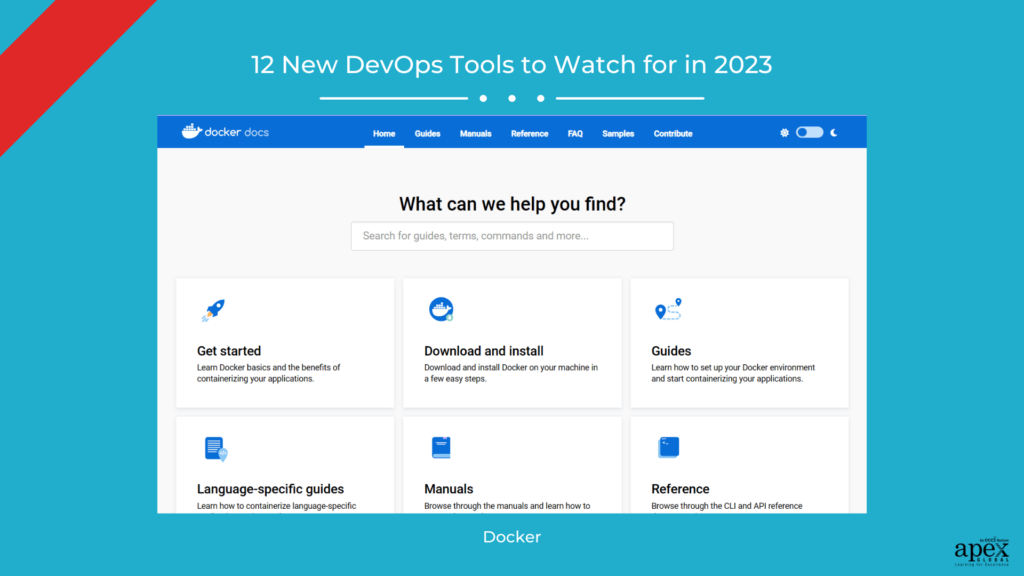
Docker takes the crown as the best container management tool, offering seamless integration with third-party applications. With Docker Hub, the world’s largest repository of container images, businesses can efficiently build, share, and store applications.
- Access to a vast repository of container images
- Public and private repository options available
- Share and store container images effortlessly
- Seamless integration with third-party applications
- Ideal for businesses of all types, deployable on various platforms
Key Tip: Leverage Docker’s extensive third-party integration capabilities to enhance your containerized applications.
Terraform: simplifying infrastructure management with code
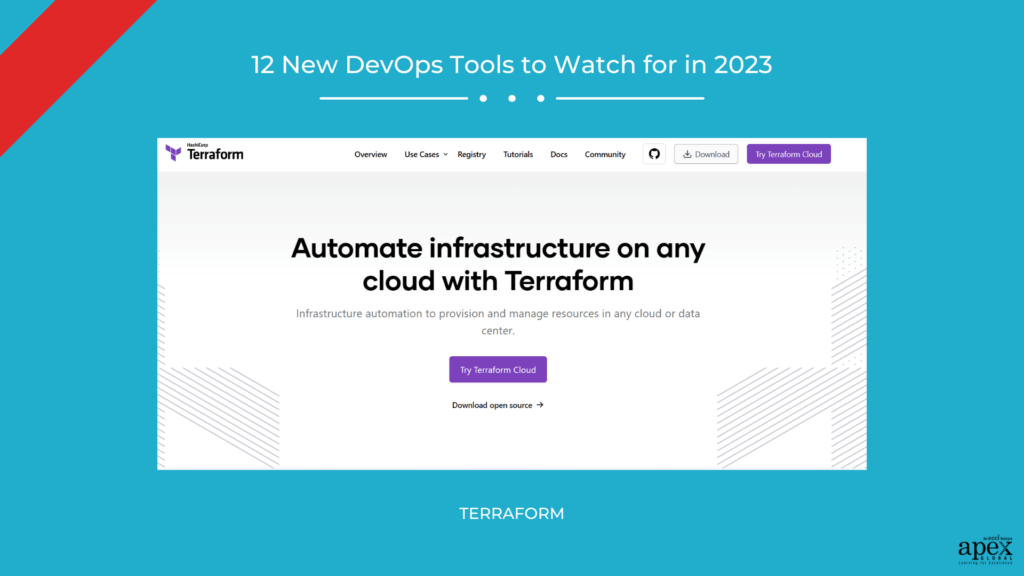
Terraform, an open-source infrastructure-as-code (IaC) tool, empowers developers to manage and provision resources across cloud platforms. With Terraform, you can define and configure infrastructure resources using code, ensuring faster and more reliable automation.
- Declarative syntax for defining infrastructure state
- Supports multiple cloud platforms and services
- Enables consistent management across different cloud providers
- Facilitates infrastructure management at scale with reusable modules
- Plan-and-apply workflow for previewing and validating changes
Key Tip: Automate your infrastructure provisioning with Terraform’s infrastructure-as-code approach. Define your infrastructure in code, version control it, and easily replicate and scale your environments.
Spinnaker: empowering multi-cloud continuous delivery
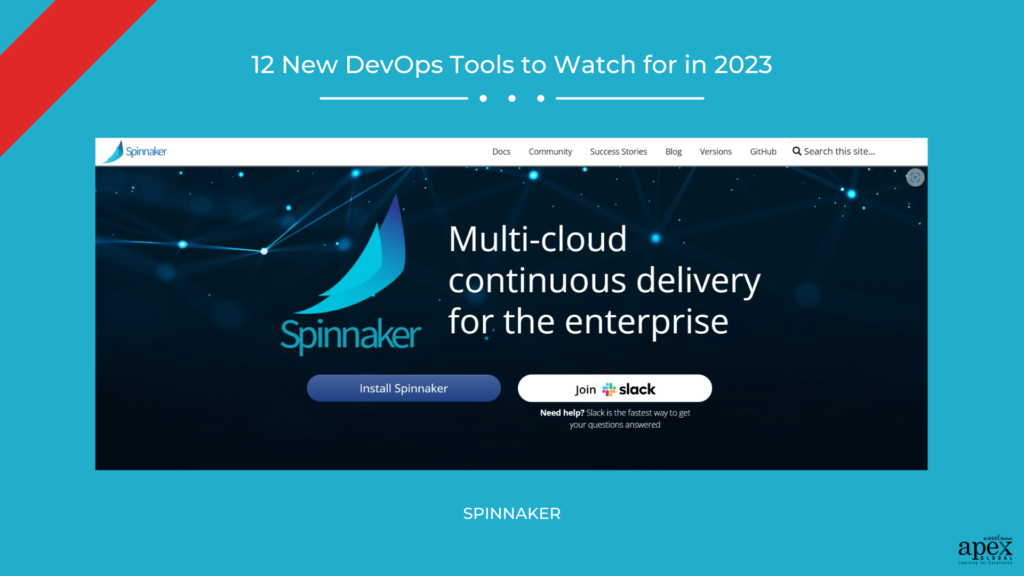
Spinnaker, an open-source continuous delivery platform, enables high-velocity software releases with confidence across multiple clouds. Its key feature is deploying applications to different clouds using proven strategies.
- Open-source platform for multi-cloud continuous delivery
- Enables deployments with best practices and proven strategies
- Integration with Azure for seamless deployments
- Build, Bake, Deploy scenario for immutable VM images
- Abstractions mapping to Azure infrastructure components
Key Tip: Simplify your multi-cloud deployments with Spinnaker’s powerful continuous delivery capabilities. Use the Build, Bake, Deploy scenario to create immutable VM images and deploy them to different clouds.
AWS CodePipeline: streamlining software development
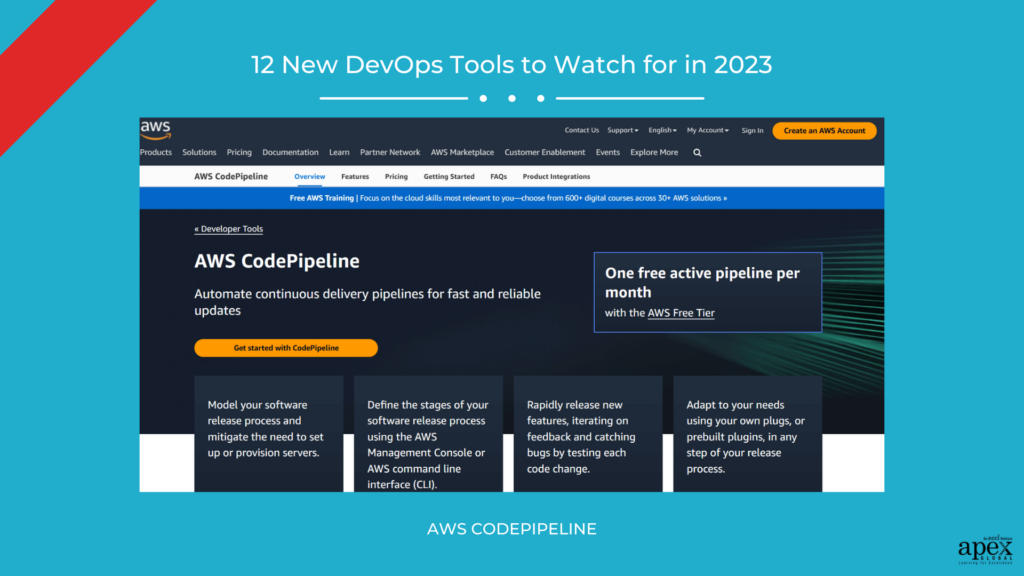
AWS DevOps, a part of Amazon Web Services, offers an integrated toolkit for managing the complete software development lifecycle. With tools like AWS CodePipeline, CodeBuild, CodeDeploy, and CodeStar, it simplifies and enhances DevOps practices on AWS.
- Integrated DevOps tools for seamless software development
- AWS CodePipeline for continuous integration and delivery
- AWS CodeBuild for managed build processes
- AWS CodeDeploy for automated deployments
- AWS CodeStar for project management and collaboration
Key Tip: Leverage AWS DevOps toolkit’s deep integration with the AWS infrastructure. Seamlessly deploy your applications to AWS services like EC2 and S3, ensuring smooth and reliable deployments.
Puppet: unleashing conflict detaching and situational awareness
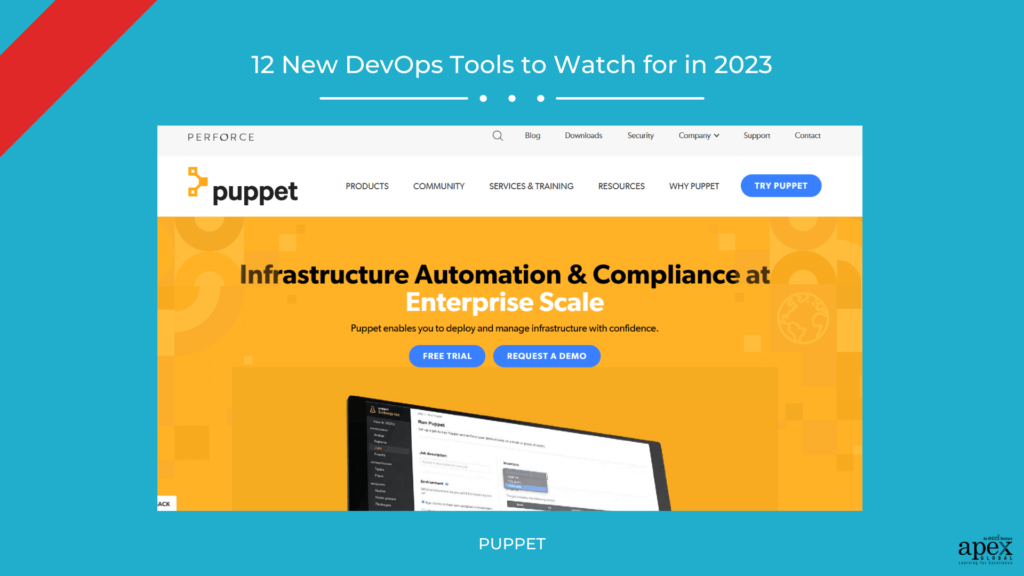
Puppet reigns as the best configuration management tool, offering conflict detaching and situational awareness. The Puppet Enterprise provides a comprehensive view of your infrastructure and enforces consistency while allowing desired changes.
- Gain a clear view of your infrastructure
- Automatic enforcement of desired state and compliance
- Conflict detection and situational awareness
- Extensive library of prebuilt modules
- Cloud-based solution for cloud migration and compliance
Key Tip: With Puppet, leverage its unique desired state situational awareness feature. Gain deep insights into your infrastructure’s configuration and ensure compliance.
Chef: empowering devops platforms with seamless configuration management
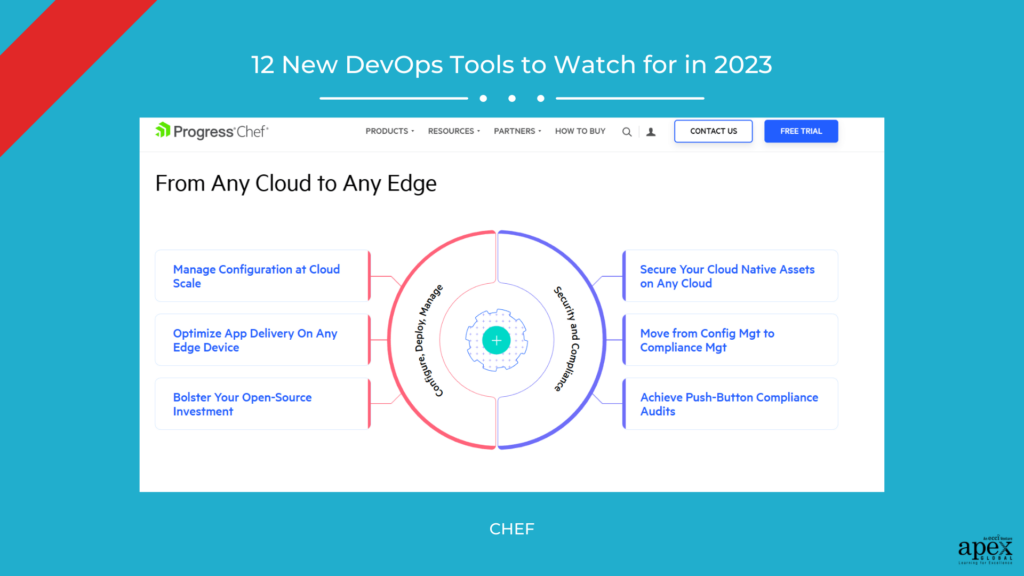
Chef, similar to Puppet, is an automation tool that automates the configuration and management of infrastructure. It promotes collaboration, automates infrastructure, and ensures compliance and security, making it safer and faster to deliver value to customers
- Leading tool for DevOps management and collaboration
- Trusted by Fortune 500 and Global 5000 companies
- Open-source software with no usage restrictions
- Express security policies and infrastructure as code
- Modernize development and delivery across platforms
Key Tip: Automate your infrastructure configuration with Chef’s powerful automation capabilities. Utilize Chef’s powerful feature of expressing security policies, infrastructure, and application lifecycle as code.
Honorary mentions:
- TeamCity: TeamCity is a feature-rich CI/CD tool that enables you to automate your software development process.
- CircleCI: CircleCI is a cloud-based CI/CD platform that empowers organizations to automate their software development process.
- Splunk: Splunk is a comprehensive monitoring and analytics platform that allows you to collect and analyze data from various sources, including applications and infrastructure.
Final thoughts
As we wrap up this exploration of the top 12 DevOps tools to watch in 2023, one thing becomes clear: the path to successful DevOps adoption is paved with powerful automation and collaboration. These tools are the fuel that propels organizations forward, enabling them to navigate the ever-evolving landscape of software development. From Jenkins X for continuous integration to Grafana’s visual prowess, each tool brings its own unique flavor to the DevOps table.
But remember, tools alone won’t guarantee success. It’s the culture of collaboration that truly sets the stage for remarkable achievements. So, foster a spirit of teamwork, encourage knowledge sharing, and embrace agile methodologies. Let the tools we’ve discussed be the catalysts that ignite the flames of innovation within your organization.
In addition to exploring the top DevOps tools of 2023, it’s essential to invest in the right training and education for your organization. At APEX Global Learning, we offer customized DevOps training programs tailored to meet the specific needs of your corporate organization.
Visit our website or contact us today for a free consultation on how we can help your organization thrive in the world of DevOps and Agile methodologies.

